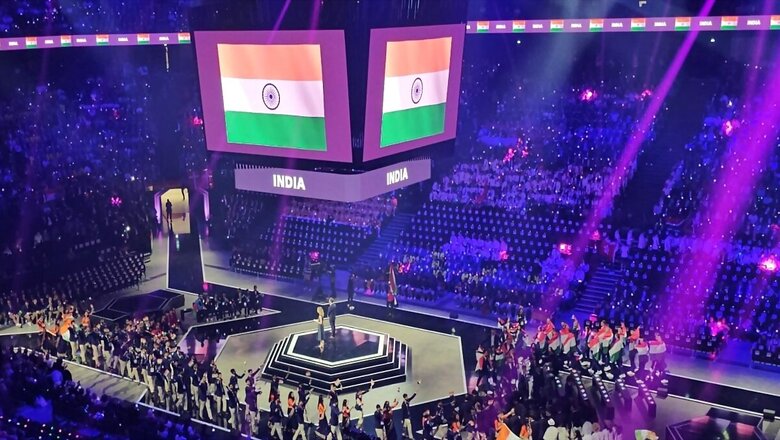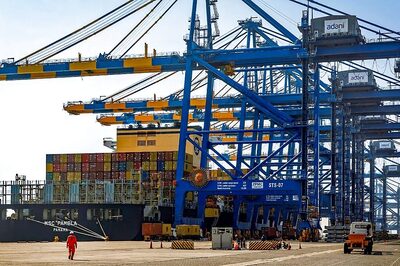
views
The 47th edition of the biennial WorldSkills Competition 2024 is underway in Lyon, France. The competition features a 60-member contingent from the WorldSkills India Team competing in 52 skill categories against participants from over 70 countries. Often considered the “Olympics of Skilling,” this international event includes more than 1,400 competitors and 1,300 experts.
The WorldSkills Competition is a platform that celebrates excellence in a wide range of skills, from construction and manufacturing to information technology and creative arts. The 60-member India team, with 20 per cent women, marks a breakthrough in this edition, as they compete in traditionally male-dominated fields such as welding, plumbing, and heating. They have received rigorous training, supported by leading corporations in the manufacturing sector, with expertise from industry leaders and institutions across the country.
Unfortunately, the same approach is missing in the female-dominated (67 per cent) beauty and wellness sector, as its skills potential still needs to be properly recognised within the current contingent of the WorldSkills Competition. It would be a significant step forward if the National Skill Development Corporation (NSDC) and CSR funds could rigorously support these skills in the IndiaSkills competition, the country’s premier event aimed at demonstrating the highest skilling standards and providing a platform for young people to showcase their talent across various skills.
The National Education Policy (NEP) 2020 emphasises the importance of skill development, allocating 40 per cent of credits to this area. It is essential to ensure that financial constraints do not hinder access to skill development. Models for financial aid, scholarships, and low-interest loans must be explored to support individuals in pursuing skilling programmes, particularly in the beauty and wellness sector, which plays a significant role in shaping India’s future.
The regulatory framework for skill development needs refinement to adapt to changing industry requirements and technological advancements. Streamlining and simplifying the accreditation and certification processes are areas that require attention. However, the true power lies in collaboration. The involvement of academia, industry, and training providers is crucial to achieving India’s skilling objectives. Together, we can significantly impact the future of skill development.
To make India a global skills capital, we must focus on eleven major paradigms and enablers: aspiration and advocacy, capacity, quality, synergy, mobilisation and engagement, and international partnerships. Each stakeholder has a unique role to play in this collaborative effort. Together, we can shape a skilled workforce at a global level, one that meets the world’s evolving needs and could be a game-changer for India.
Currently, India’s performance in the beauty and wellness sector in global skill competitions is not on par with that of other countries. There is a need to provide more exposure and high-standard training for our boys and girls in these global competitions so they can make their mark. Beauty contests such as Miss World or Miss Universe have created a distinct identity, dispelling earlier misconceptions about the fashion industry and fostering unique recognition. Similarly, the beauty and wellness sector has unlimited potential and can showcase skilled talent globally. However, our approach to honing the skills of individuals in this sector requires focused improvement to ensure they leave an indelible mark in international competitions.
The WorldSkills Competition hosts global championships every two years, attracting young people from around the world to compete and win medals in their chosen skills. The competitions span various industries, from joinery to floristry, hairdressing to electronics, auto-body repair to bakery, beauty and wellness, and more. Competitors are selected from skills competitions held in WorldSkills member countries and regions, representing the best of their peers. One of the legacies of these competitions is the increased visibility of skilled professional education, serving as a powerful tool for social and economic transformation.
At the global level, a key obstacle to India’s dominance in international skill competitions is the lack of a more globalised approach to our various skill sets. This critical issue requires immediate attention and action, as addressing it could significantly enhance India’s position in the global skill development arena.
In the WorldSkills Competition 2022, the 50-member Indian contingent received only 13 medallions for appreciation and was ranked 11th, while China topped the rankings with 11 gold, eight silver, and nine bronze medals. Although India has yet to win any gold medals, young professionals possess immense potential to excel in various skill sets and secure medals in global competitions, which would foster international exposure and create optimism about India’s future in skill development.
Need to revisit strategy
An enabling environment must be created within training institutes, where there is an uninterrupted exchange of information and best practices related to industry and professional education. New ideas and processes must inspire school-aged youth to dedicate themselves to technical and creative careers to build a better future.
If our skilled participants are not winning medals in the “Olympics of Skills,” it is a clear indication that we need to revisit our strategy. We must explore the potential of specific skill sets to excel, as the standardised competition environment ensures that participants from around the world compete on a level playing field. This reiteration of the need for continuous improvement and adaptation should highlight the importance of these aspects in skill development.
The writer is co-founder and MD of Orane International, a training partner of the National Skill Development Corporation (NSDC) and a network Member of India International Skills Centres, an initiative of GoI. The views expressed in the above piece are personal and solely those of the author. They do not necessarily reflect News18’s views.




















Comments
0 comment